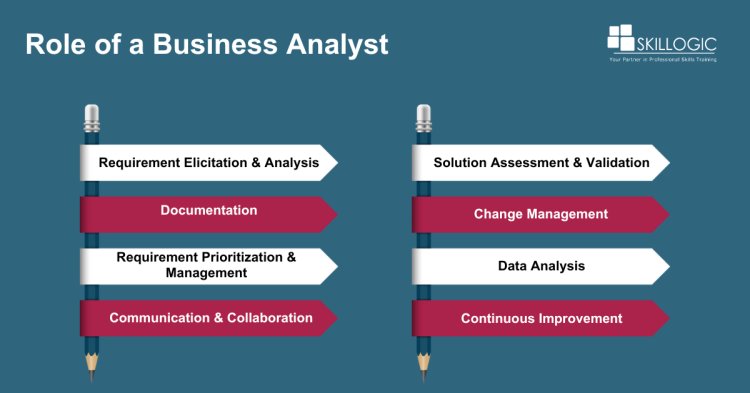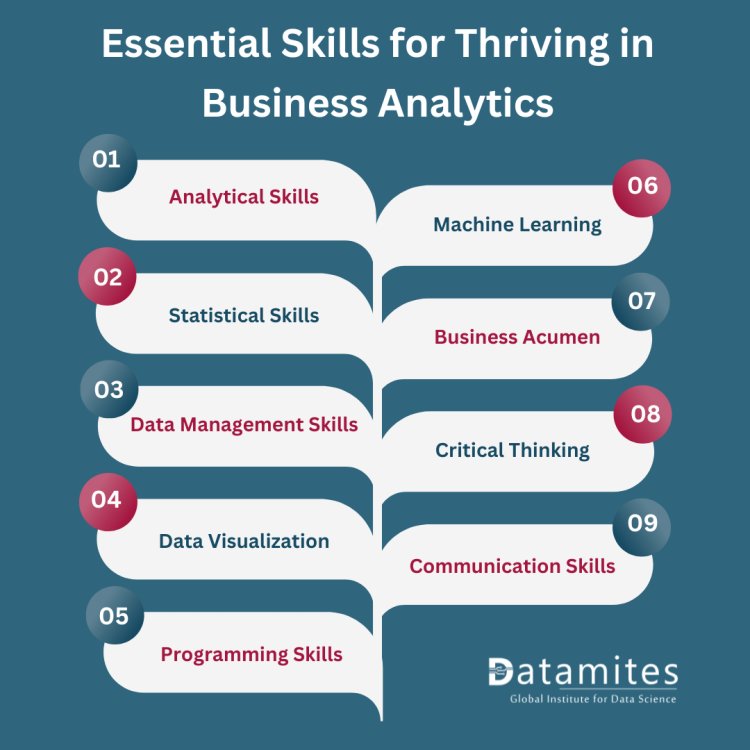How to Become a Business Analyst: A Roadmap
Becoming a business analyst requires a blend of analytical skills, industry knowledge, and technical expertise. This roadmap guides you through the essential steps to kickstart your career in the field.

In the rapidly evolving landscape of modern business, the Business Analyst (BA) plays an indispensable role. Acting as a liaison between business goals and technological solutions, BAs guarantee that organizations make well-informed decisions and successfully meet their objectives.
As per findings from a Maximise Market Research study, the Business Analytics Market reached an estimated value of around US$ 78.48 billion in 2022. The market is anticipated to witness an annual growth rate of 7.5% from 2023 to 2029, culminating in a total revenue of nearly US$ 130.21 billion. In this article, we will delve into the fundamentals of business analytics, exploring its importance in today's data-driven world and discussing key techniques and tools utilized in the process
Business Analytics: A Comprehensive Overview
Business analytics involves the use of data, statistical analysis, and quantitative methods to gain insights and make informed decisions within organizations. It encompasses a wide range of techniques, including data mining, predictive modeling, optimization, and data visualization. By leveraging various tools and technologies, such as statistical software, machine learning algorithms, and big data platforms, businesses can extract valuable insights from large volumes of data.
Research indicates that the business analytics job market is forecasted to grow at a compound annual growth rate (CAGR) of 14.3% by 2026. Analysts, particularly those holding expert-level certifications, are receiving increased salary offers from these firms.
These insights can be used to improve operational efficiency, identify market trends, optimize marketing strategies, enhance customer experiences, and drive overall business growth. Ultimately, business analytics empowers organizations to make data-driven decisions that lead to better outcomes and competitive advantages in today's dynamic marketplace.
Refer:
- Business Analyst Vs Business Analytics Expert
- Business Intelligence Vs Business Analytics
- Effective Techniques of Business Analyst
Exploring the Role of a Business Analyst: Unveiling Core Duties
A business analyst is a professional who plays a crucial role in linking business objectives with technology solutions within an organization. Their primary responsibilities revolve around analyzing the business domain, identifying business needs, and translating them into actionable requirements for various stakeholders, including developers, designers, and project managers. Here are some of the core responsibilities of a business analyst:
Requirement Elicitation and Analysis: Business analysts work closely with stakeholders to understand their needs, objectives, and constraints. They conduct interviews, workshops, and surveys to gather requirements effectively. This involves identifying both functional requirements (what the system should do) and non-functional requirements (constraints on the system's behavior).
Documentation: They document requirements in various forms such as business requirements documents (BRDs), functional specifications, use cases, user stories, and process flows. Clear and comprehensive documentation is crucial for ensuring a shared understanding among stakeholders and guiding the development process.
Requirement Prioritization and Management: Business analysts prioritize requirements based on business value, urgency, and feasibility. They collaborate with stakeholders to make informed decisions about which features should be included in each release or iteration.
Communication and Collaboration: Business analysts serve as a liaisons between business stakeholders and technical teams. They facilitate communication and collaboration among different departments or teams to ensure alignment on project objectives and requirements.
Solution Assessment and Validation: They assess proposed solutions to ensure they meet business needs and align with organizational goals. This may involve evaluating existing systems, conducting feasibility studies, and validating proposed solutions through prototyping or proof of concept.
Change Management: Business analysts anticipate and manage changes to requirements throughout the project lifecycle. They assess the impact of changes on scope, schedule, and budget and work with stakeholders to address any potential issues or conflicts.
Data Analysis: Depending on the nature of the project, business analysts may be involved in analyzing data to identify trends, patterns, and insights that can inform decision-making and improve business processes.
Continuous Improvement: Business analysts strive to continuously improve processes and methodologies within their organization. They may conduct post-implementation reviews to evaluate the success of projects and identify areas for improvement in future initiatives.

Surging Demand for Business Analysts
The demand for business analysts remained robust and was expected to continue growing in various industries. Here are some points outlining the demand for business analysts from various industries' perspectives:
Information Technology (IT): With the rapid advancement of technology, IT companies are experiencing a growing demand for business analysts. These professionals play a critical role in bridging the gap between technical teams and business stakeholders, ensuring that IT solutions align with organizational goals and objectives.
Finance and Banking: In the finance sector, business analysts are essential for analyzing market trends, customer behavior, and financial data to drive strategic decision-making. They help financial institutions optimize processes, improve risk management practices, and enhance customer satisfaction through the implementation of effective business solutions.
Healthcare: The healthcare industry relies on business analysts to streamline operations, enhance patient care, and ensure regulatory compliance. These professionals work on projects ranging from implementing electronic health records (EHR) systems to optimizing supply chain management, ultimately improving efficiency and reducing costs while maintaining high standards of care.
Retail and E-commerce: Business analysts in the retail and e-commerce sectors play a crucial role in understanding consumer behavior, analyzing sales data, and identifying growth opportunities. They support initiatives such as website optimization, inventory management, and personalized marketing strategies to drive revenue and enhance the overall customer experience.
Manufacturing: Business analysts help manufacturing companies optimize production processes, reduce waste, and improve supply chain efficiency. They leverage data analytics and process improvement methodologies to identify areas for operational enhancement, ultimately driving cost savings and increasing competitiveness in the market.
Telecommunications: In the telecommunications industry, business analysts play a vital role in developing and implementing strategies to improve network infrastructure, enhance customer service, and launch new products and services. They analyze market trends, customer feedback, and operational data to drive innovation and maintain a competitive edge in the rapidly evolving telecom landscape.
Essential Skills for Thriving in Business Analytics:
To become proficient in business analytics, you'll need a combination of technical skills, analytical abilities, and business acumen. Here's a breakdown of the key business analytics skills required:
Analytical Skills: The ability to analyze data, identify patterns, trends, and insights is fundamental. You should be comfortable working with numbers, statistics, and various analytical techniques.
Statistical Skills: Understanding statistical methods and being able to apply them to analyze data sets is crucial. This includes concepts such as hypothesis testing, regression analysis, and probability theory.
Data Management Skills: Proficiency in handling and managing data is essential. This involves data cleaning, data manipulation, database management, and data integration.
Data Visualization: Being able to effectively visualize data and communicate insights through graphs, charts, and dashboards is vital. Tools like Tableau, Power BI, or Python libraries like Matplotlib and Seaborn are commonly used for data visualization.
Programming Skills: Knowledge of programming languages such as Python, R, SQL, or SAS is beneficial. Python and R are particularly popular for data analysis and statistical modeling, while SQL is essential for querying databases.
Machine Learning: Understanding machine learning algorithms and techniques is becoming increasingly important in business analytics. This includes supervised and unsupervised learning, classification, regression, clustering, and predictive modeling.
Business Acumen: Having a solid understanding of business processes, goals, and strategies is critical. You should be able to translate data insights into actionable business recommendations and strategies.
Critical Thinking: The ability to think critically and problem-solve is essential in business analytics. You'll often need to approach complex problems analytically and come up with creative solutions.
Communication Skills: Being able to effectively communicate your findings and insights to non-technical stakeholders is important. This includes writing clear reports, giving presentations, and engaging in discussions with colleagues and clients.

Refer:
- Business Analytics Expert in India
- Business Analytics Course Fee in India
- Business Analytics Scope in India
How to Become a Business Analyst: A Roadmap
Becoming a business analyst involves a combination of education, skill development, and practical experience. Here's a roadmap to help you navigate the path to becoming a business analyst:
Understand the Role: Start by researching and understanding what a business analyst does. A business analyst acts as a liaison between business stakeholders and technology teams, analyzing processes, identifying needs, and proposing solutions to help organizations achieve their goals.
Education: While a specific degree is not always required, having a background in business, finance, economics, information technology, or a related field can be beneficial. Consider pursuing a bachelor's degree in one of these areas. Additionally, there are specialized business analytics courses and certifications that can provide valuable knowledge and skills.
Get Certified: While not always necessary, obtaining certifications can enhance your credibility and marketability as a business analyst. Consider pursuing a business analytics certification such as
- Certified Business Analysis Professional (CBAP) offered by the International Institute of Business Analysis (IIBA).
- Entry Certificate in Business Analysis (ECBA) also offered by IIBA.
- Project Management Professional (PMP) offered by the Project Management Institute (PMI), which includes aspects of business analysis.
Gain Experience: Look for opportunities to gain practical experience in business analytics training. This could include internships, entry-level positions, or projects within your current organization. Seek out opportunities to work on cross-functional teams and projects where you can apply your analytical skills.
Build a Portfolio: As you gain experience, build a portfolio showcasing your projects, skills, and achievements as a business analyst. This can include case studies, process maps, requirements documents, and any other relevant artefacts.
Hands-on Projects:
- Engage in hands-on projects either through coursework, personal initiatives, or involvement in extracurricular activities.
- Work on real-world business problems or simulations to gain practical experience in applying analytical techniques and methodologies.
Internship Opportunities:
- Seek a business analyst course with internship opportunities within companies or organizations where you can apply your analytical skills in a professional setting.
- Look for internships specifically in business analysis, data analysis, or related roles to gain relevant experience and build your resume.
Career Guidance:
- Seek mentorship from experienced business analysts or professionals in related fields to gain insights and guidance on career advancement.
- Set clear career goals and develop a plan for achieving them, including acquiring necessary skills, gaining relevant experience, and networking effectively.
- Regularly assess and update your skills and knowledge to align with evolving industry demands and career opportunities.
Business Analyst Salary: Worldwide
In the USA, the salary ranges from USD 93,947 per year according to a Glassdoor report.
In the UAE, the salary ranges from AED 108,896 per year according to an Indeed report.
In India, the salary ranges from INR 9,50,000 per year according to a Glassdoor report.
In Canada, the salary ranges from CAD 74,742 per year according to a Glassdoor report.
In Germany, the salary ranges from EUR 62,000 per year according to a Glassdoor report.
In Australia, the salary ranges from AUD 104,557 per year according to an Indeed report.
In South Africa, the salary ranges from ZAR 588,312 per year according to an Indeed report.
In Saudi Arabia, the salary ranges from SAR 159,305 per year according to a PayScale report.
In Switzerland, the salary ranges from CHF 120,000 per year according to a Talent.com report.
In the UK, the salary ranges from GBP 44,652 per year according to an Indeed report.
Refer:
- Business Analytics Course Fee in Bangalore
- Business Analytics Course Fee in Hyderabad
- Business Analytics Course Fee in Pune
Factors Affecting Business Analyst Salary:
Here are some factors that can affect a business analyst's salary:
- Experience: More experienced analysts typically command higher salaries.
- Education: Advanced degrees or certifications may lead to higher pay.
- Industry: Salaries can vary based on the industry the analyst works in.
- Location: Cost of living and demand for analysts in a particular region can impact salary.
- Company size: Larger companies often offer higher salaries than smaller ones.
- Skills and expertise: Specialized skills or expertise in certain areas may lead to higher pay.
- Performance: High-performing analysts may receive bonuses or salary increases.
- Economic conditions: Economic trends and market demand can influence salary levels.
- Negotiation: Effective negotiation skills can result in a higher starting salary or raises over time.
Embarking on the path to becoming a Business Analyst is an enriching journey that demands a blend of education, skill enhancement, and hands-on experience. By adhering to this roadmap and maintaining dedication to your objectives, you can set sail on a prosperous career in business analysis. It's crucial to bear in mind that ongoing learning and flexibility are vital attributes in this constantly evolving domain. Therefore, nurture your curiosity, sustain your drive, and you'll discover yourself in a fulfilling and dynamic profession, where you can wield significant influence on organizations as a Business Professional.
Aspiring business analysts have the opportunity to enhance their knowledge and expertise through various educational channels, including respected institutions like SKILLOGIC® institute. Recognized as a leading international training provider, SKILLOGIC® offers specialized certification programs spanning a wide range of fields such as Project Management, Quality Management, Cybersecurity, Software Development, and Business Analytics. With a track record spanning over a decade, SKILLOGIC® is synonymous with excellence, serving a diverse global community of over 100+ learners. Their comprehensive offerings encompass more than 25 accreditations and partnerships, bolstered by a dedicated team of over 100 experienced instructors.
SKILLOGIC offers top-tier certification courses in Six Sigma, PMP, Cybersecurity, and Business Analytics, led by industry experts. Known for its high-quality training, SKILLOGIC provides valuable real-world insights. With more than a decade of experience, its Business Analyst course is available offline in Bangalore, Chennai, Pune, and Hyderabad, making learning accessible across India.

0
546